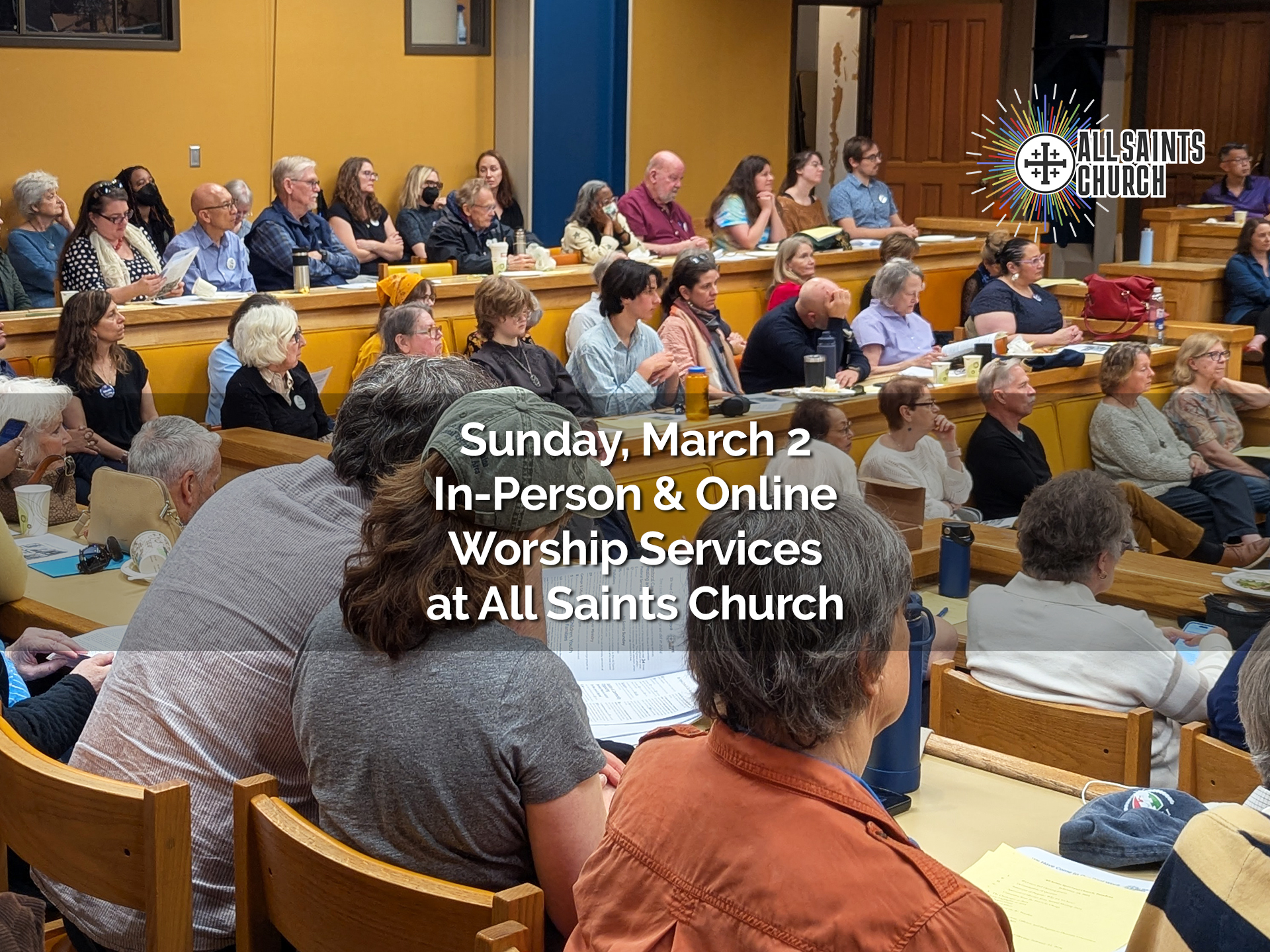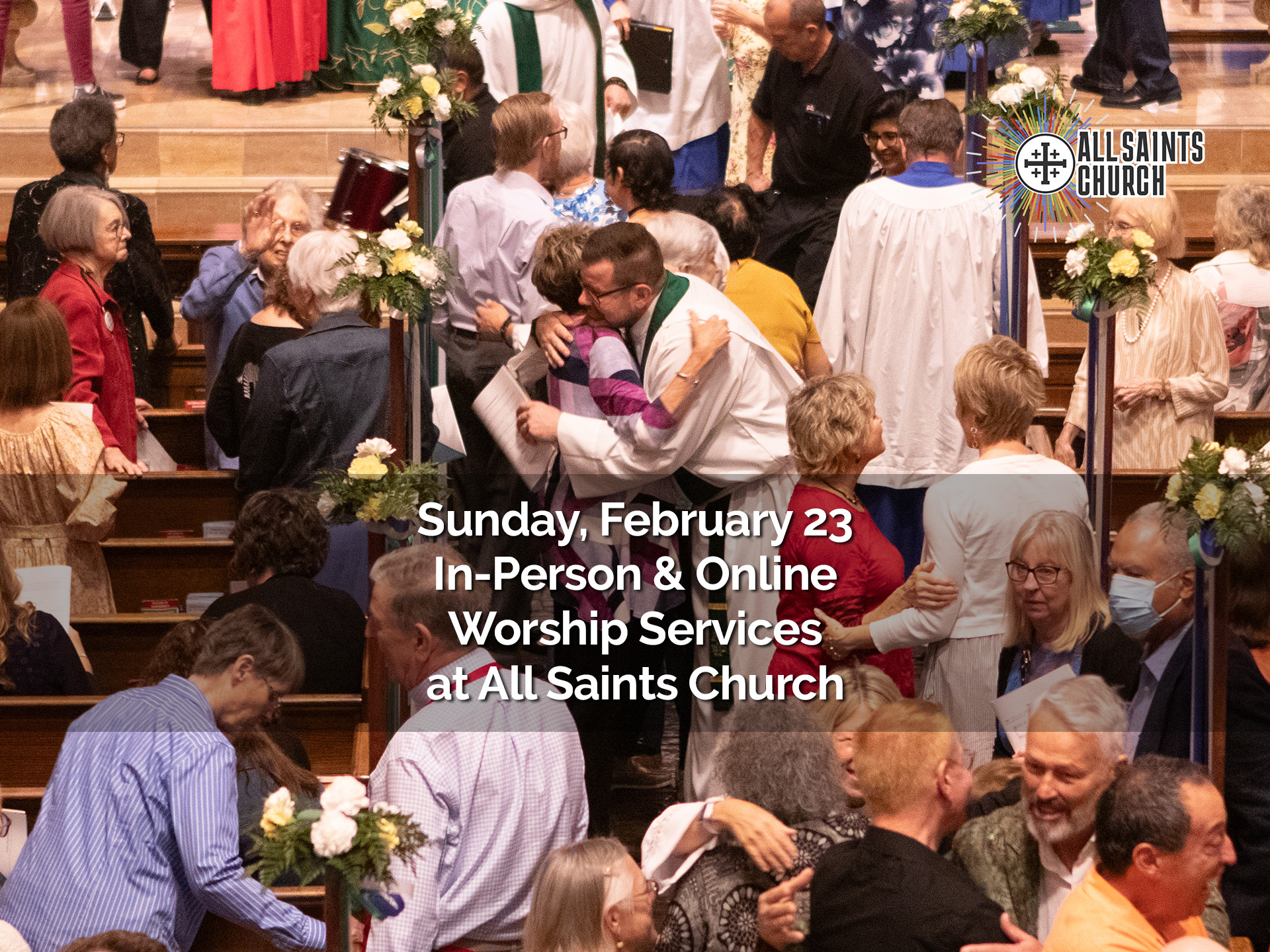by Mike Kinman, Rector of All Saints Church, Pasadena
The gospel isn’t meant to be gulped down on Sunday morning, but gnawed on through the week so it really becomes a part of us. You’ve got to work at it, like a dog with a good bone! Here’s the Gospel for this coming Sunday —the Third Sunday of Easter— reminding us of the need to walk together, and listen for the voice of Christ Gnaw away!
Third Sunday of Easter: Luke 24:13-35
That very day, the first day of the week, two of the disciples were going to a village called Emmaus, about seven miles from Jerusalem, and talking with each other about all these things that had happened.
While they were talking and discussing, Jesus himself came near and went with them, but their eyes were kept from recognizing him. And he said to them, “What are you discussing with each other while you walk along?” They stood still, looking sad. Then one of them, whose name was Cleopas, answered him, “Are you the only stranger in Jerusalem who does not know the things that have taken place there in these days?” He asked them, “What things?” They replied, “The things about Jesus of Nazareth, who was a prophet mighty in deed and word before God and all the people, and how our chief priests and leaders handed him over to be condemned to death and crucified him. But we had hoped that he was the one to redeem Israel. Yes, and besides all this, it is now the third day since these things took place. Moreover, some women of our group astounded us. They were at the tomb early this morning, and when they did not find his body there, they
came back and told us that they had indeed seen a vision of angels who said that he was alive. Some of those who were with us went to the tomb and found it just as the women had said; but they did not see him.”
Then he said to them, “Oh, how foolish you are, and how slow of heart to believe all that the prophets have declared! Was it not necessary that the Messiah should suffer these things and then enter into his glory?” Then beginning with Moses and all the prophets, he interpreted to them the things about himself in all the scriptures. As they came near the village to which they were going, he walked ahead as if he were going on. But they urged him strongly, saying, “Stay with us, because it is almost evening and the day is now nearly over.” So he went in to stay with them. When he was at the table with them, he took bread, blessed and broke it, and gave it to them. Then their eyes were opened, and they recognized him; and he vanished from their sight. They said to each other, “Were not our hearts burning within us while he was talking to us on the road, while he was opening the scriptures to us?”
That same hour they got up and returned to Jerusalem; and they found the eleven and their companions gathered together. They were saying, “The Lord has risen indeed, and he has appeared to Simon!” Then they told what had happened on the road, and how he had been made known to them in the breaking of the bread. That very day, the first day of the week, two of the disciples were going to a village called Emmaus, about seven miles from Jerusalem, and talking with each other about all these things that had happened.
The Backstory – What’s Going On Here?
The story of the disciples meeting Jesus on the road to Emmaus is only found in Luke’s Gospel (although it is referenced in Mark 16:12). Luke places this story immediately after the account of the empty tomb … and word has traveled fast because he notes it happens “that very day.”
The story does what resurrection appearances do — it lets us know that Jesus is not dead but risen. And just like the two men at the tomb who told the women “why do you seek the living among the dead?” it is clear that this shouldn’t be a surprise to anyone! The message rings clear that throughout all the fear and despair of Jesus’ arrest, crucifixion and death, God has always been in control. Jesus — while still unknown to the disciples on the road — not only chastises them for their confusion but links what has happened to the overall epic of God’s love affair with the people of Israel. God has always been in control.
The climax of the story is the post-resurrection institution of the Eucharist. Jesus commandment of Luke 22:14-20 (the Last Supper) is enacted as he goes through the Eucharistic actions of take, bless, break, give … and it is through those actions “their eyes were opened and they recognized him.” The story sets the stage for the ongoing Christian experience of the resurrection that we share in to this day.
A few things to chew on:
The disciples on the road were not faithless, they were confused. So much had happened in the past four days. They had been on a roller coaster of emotion, and they literally did not know what to hope or believe. Jesus doesn’t chastise them for not absolutely believing the women’s account of the empty tomb … but for forgetting the larger picture that everything fit into. He takes the time, walking with them, to paint “the big picture” — starting with Moses and all the prophets — and help them see where all the pieces fit.
Facebook, Twitter, Snapchat, 24-hour cable news — all of these things encourage us to be reactive and make snap judgments and mount fierce arguments. The road
to Emmaus story reminds us of the need to walk together, and listen for the voice of Christ … and look for how the events of the day fit into the big picture, remembering that God is bigger than all of it.
Scholars haven’t figured out exactly where Emmaus was, but regardless, the road leading into Jerusalem were dangerous to travel by night. There were robbers and others waiting to prey on people. But this story doesn’t tell us that the disciples waited until morning when it was safer to go back to Jerusalem, it says “that same hour” they went back. What had happened to them was so powerful, they couldn’t wait to share it. When have you had an experience of God that was that powerful?What did you do?
Try This:
“Were not our hearts burning within us while he was talking to us on the road, while he was opening the scriptures to us?”
The disciples on the road didn’t just meet Jesus in the breaking of the bread, but in having scripture opened to them. Prayer and study with scripture is a key part of discipleship … of meeting and following Christ. Prayer and study with scripture helps us frame our whole lives differently — helps us look for how we fit into the “big picture” and see how our stories are all part of God’s epic love story with us all.
This week, take a few minutes each day and just sit with a piece of scripture. It can be a different reading each day (try the Gospel reading from the daily office) or it can be a favorite passage or passages. Whatever it is, read it over a couple times and then just sit with it? Where do you see yourself and your life in the story? Who is God or Jesus in the passage? What message can you take that can help you shape your day?
Write this:
The disciples in this story got to walk with Jesus, sit with Jesus, eat with Jesus. Quite an opportunity. If you had a chance to have a cup of coffee with Jesus (perhaps like the comic strip – www.coffeewithjesus.com), what would you ask? What stories would you tell? This week, journal about what that conversation might be like.
Strangers on the Road
“Love all, trust a few, do wrong to none.” — William Shakespeare, All’s Well That Ends Well
Whom do you trust?
When the “Breaking News” notice comes on CNN, do you believe what comes next? When a story comes across your Facebook feed – do you think it is “real news” or “fake news?” What news station or website do you go to learn more or verify it? What people and their perspectives and takes do you trust? What makes you believe? What makes information trustworthy for you?
President Reagan was famous for saying, “trust but verify.” That wasn’t bad advice — particularly because it begins with “trust.” We need to be open to incredible wisdom coming from unexpected sources. We need to be open to meeting Christ where we least expect it.
But we also need to remember what “verify” means. For the disciples on the road to Emmaus, it meant taking the time to consider what he had said, looking for — and eventually finding — signs of the presence of the living Christ in their midst and in their hearts.
Being open to finding Jesus in unexpected places takes both of these things. It takes a willingness to have unexpected people tell us the unbelievable … but also the patience and insight to “test the spirits” and see if the voice we are hearing sounds like the Christ we know.
Jesus berates the disciples for being “slow of heart to believe,” but in many ways, isn’t that just human nature? Remember, this is also the Jesus that said: “Beware that no one leads you astray. For many will come in my name, saying, ‘I am the Messiah!’ and they will lead many astray.”
(Matthew 24)
We need to be open to Christ but also listen deeply to make sure it is truly Christ’s voice that we here. Is it a voice that calls us to love all? Is it a voice that affirms each person’s beauty and dignity as a child of God? These are signs that the voice is of Christ.
When the disciples had listened deeply and knew it was Jesus, they were changed from within and they could not be contained. But if they had run off convinced as soon as they had seen him, they probably wouldn’t have had as convincing a story to tell in Jerusalem.
Whom do you trust? Are you willing to trust in the unexpected person? Are you willing to listen deeply enough to ensure that trust is well placed?
How can we be a community that helps us do these things together?
Check out the rest of Sunday’s readings
The Lectionary Page has all of the readings for this Sunday and every Sunday – click here for this Sunday’s readings.
Collect for Sunday — Pray this throughout the week as you gnaw on this Gospel.
O God, whose blessed Son made himself known to his disciples in the breaking of bread: Open the eyes of our faith, that we may behold him in
all his redeeming work; who lives and reigns with you, in the unity of the Holy Spirit, one God, now and for ever. Amen.
Want to read more?
“The Text This Week” is an excellent online resource for anyone who wants to dive more deeply into the scriptures for the week.
Mike Kinman is the Rector of All Saints Church in Pasadena. “Gnaw on This” is a weekly publication.



